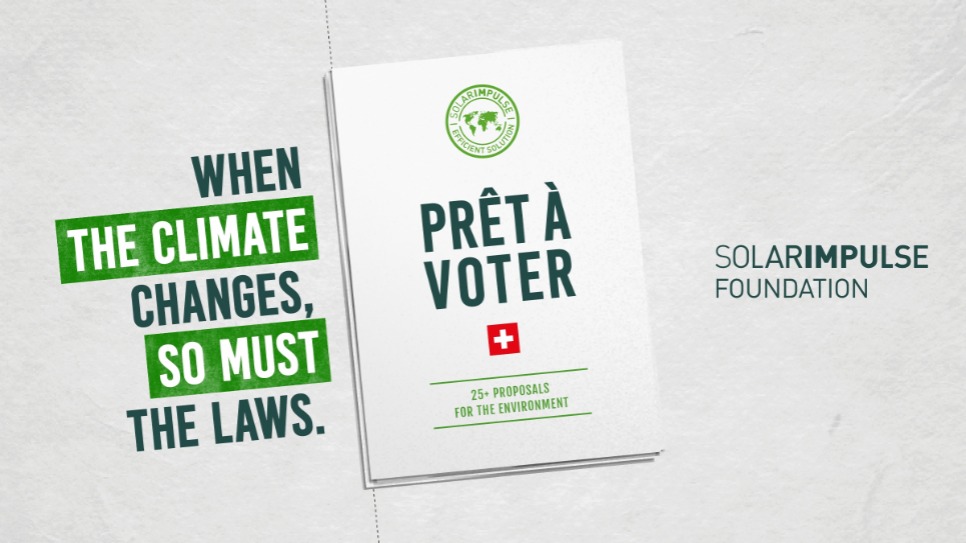News - June 20, 2023
Solar Impulse Launches Prêt à Voter Switzerland


Written by Solar Impulse Foundation
Regardless of division and continuous attacks, reason spoke louder and the encouraging results of the referendum where the Swiss Population voted to adopt the climate law succeeded to present the ecological transition as an unprecedented opportunity. Recognizing this as a step in the right direction, the Solar Impulse Foundation aims to go even further with its innovative initiative “Prêt à Voter”, a non-partisan effort to accelerate the adoption of cleantech solutions by modernising laws that capture the benefits afforded by these technologies.
For Bertrand Piccard, President and Founder of the Solar Impulse foundation, the result of the vote was the right move, even for the opponents.
"I think most opponents will be satisfied with the result when they see the reality of the figures and all that this law will achieve, economically and ecologically, as well as for people's quality of life. Decision-makers are aware of environmental problems, but often lack the popular support to act. This vote will give them the freedom to seize the economic opportunities offered by the ecological transition", explains Piccard.
The Solar Impulse Foundation sees the ecological transition as an opportunity not only to boost the Swiss economy, but also to enhance the quality of life of its population. To this end, Bertrand Piccard recently shared over 25 legislative proposals with the Swiss Parliament to pave the way for the rapid adoption of innovations in clean technologies.
Called“Prêt à Voter”, this series of recommendations has been developed in collaboration with innovators and legal experts to remove barriers to the adoption of solutions that protect the environment and are financially viable. These recommendations are designed so that parliamentarians can use them as they see fit - by submitting them as they are, or developing them with additional input.
"We know there are financially viable solutions to protecting the environment - we've identified over 1,500 - but the current legal framework still allows the use of old systems, processes and devices that are polluting, inefficient and wasteful. Each of these recommendations aims to modernise norms and standards to bring these innovations to market," explains Piccard.
According to figures from the Federal Office for the Environment, the most polluting sectors in Switzerland are transport (road vehicles), responsible for 31% of emissions, households/services (heating with fossil fuels), for 26%, and industry (energy consumption), for 17%. The results of a study by the Solar Impulse Foundation indicate that if the Prêt à Voter proposals were adopted and the solutions implemented, this would lead to a considerable reduction in emissions in these sectors in particular, and put the country on the road to zero emissions.
Many of these proposals are straightforward and non-controversial, requiring only an update of legislation to bring it into line with what technology allows today. Here are three examples;
Proposal no. 3 highlights "Vehicle-to-Grid" technology, which makes it possible to use electric vehicle batteries to balance the needs of the energy grid. With cars idle for 23 hours a day, plug-in car batteries could store excess electricity on the grid and re-inject it at peak times, helping to balance electricity supply and demand. Although perfectly logical, this system is not explicitly authorised or encouraged at present. Amendments to the Electricity Supply Act, such as obliging grid operators to take back electricity generated from renewable energies and to offer appropriate remuneration, could make this possible.
There are many ways in which residents can reduce their energy consumption, not least through their consumption of hot water. Proposal no. 11 encourages cantonal energy regulators to introduce guidelines for residential waste heat recovery, compliance with which would be a condition for obtaining subsidies. The solution that inspires this measure - Joulia - can reduce the energy required to heat shower water by up to 62% by recovering heat from grey water.
With regard to industry, Proposal no. 25 concerns a measure that could save Switzerland up to 1.4 million tonnes of CO2 by capturing and using the waste heat that escapes from industrial processes. This process could be implemented by introducing waste heat recovery requirements into the target agreements signed by companies and major consumers, notably by imposing a minimum threshold for the consumption of renewable or recovered heat.
The Solar Impulse Foundation has already begun working with key players to finalise the content of these proposals. In early May, drafts were presented to a group of parliamentarians from across the political spectrum to discuss how the proposals might be developed before being considered at future parliamentary sessions. In addition, the Foundation has begun working closely with key players in the ecological transition, including swisscleantech and Agropole, to consider how these proposals can best contribute to the uptake of clean technology innovations in these sectors.
"We face a number of administrative hurdles, mainly in terms of permits. First of all, we need to simplify the procedures, as the processes are very long and sometimes complicated. When you're a small business, this can really be a limit to your development and put you at risk. Initiatives like this are important because they raise these issues with legislators and let them know about concrete actions that will help us," says Laurent Coulot, CEO and co-founder of Insolight.
Today, the success of the ecological transition no longer depends on the continuous development of new technologies, but rather on the creation of favourable conditions for the adoption and exploitation of these innovations.
By bringing the necessary environmental solutions to political decision-makers through these Prêt à Voter proposals, the Solar Impulse Foundation hopes to continue driving the Prêt à Voter initiative forward during the forthcoming parliamentary sessions and the federal elections in October.
Read the Swiss ‘Prêt à Voter’ proposals

Written by Solar Impulse Foundation on June 20, 2023


